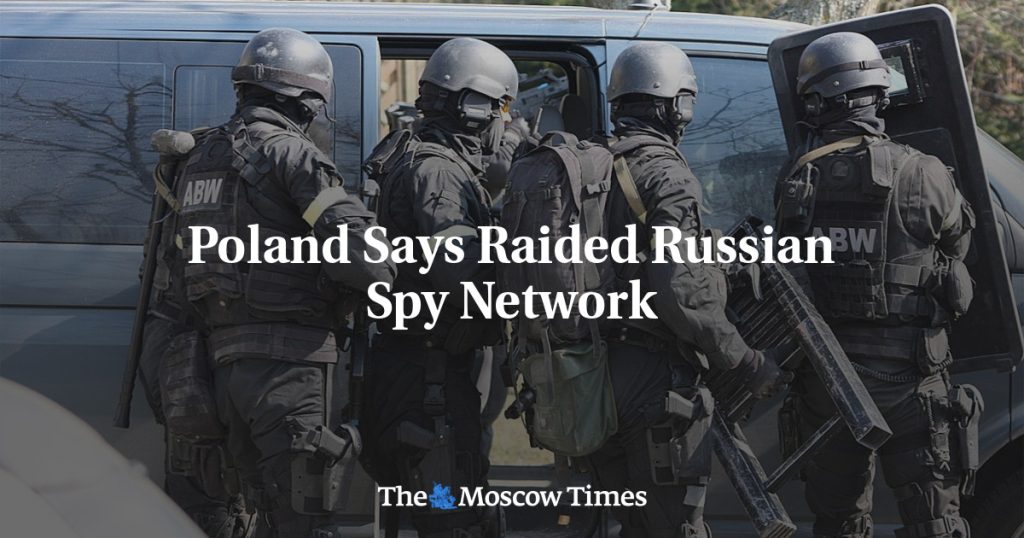Polish security services recently conducted raids on a Russian spy network in collaboration with Czech intelligence. These operations were connected to charges filed against a Polish citizen earlier this year for suspected espionage for Russia. The goal of the spy network was to advance the Kremlin’s foreign policy objectives, including weakening Poland’s position on the world stage, discrediting Ukraine, and damaging the image of European Union institutions. The security agency emphasized that these operations were part of international cooperation with various European services, particularly with partners in the Czech Republic.
The Czech Republic also made headlines by exposing a Moscow-financed network that spread Russian propaganda and exerted influence across Europe, including in the European Parliament. The group utilized the Voice of Europe news site based in Prague to disseminate information discouraging the EU from providing aid to Ukraine, which has been facing a Russian invasion since February 2022. The Polish security agency’s operations against the Russian spy network were launched following an investigation in January that led to charges against a Polish citizen involved in espionage for Russia. This individual, who operated within Polish and EU parliament circles, carried out tasks assigned and funded by Russian intelligence, focusing on propaganda, disinformation, and political provocation to establish Russian spheres of influence in Europe.
With raids conducted in Warsaw and Tychy, the Polish security agency took decisive action against the Russian spy network’s activities aimed at undermining European institutions and member states. The agency’s efforts were part of a broader strategy to combat foreign espionage and interference in the region. These recent developments highlighted the ongoing threat posed by Russian intelligence operations targeting European countries and institutions. By coordinating closely with Czech partners and other European services, the security agency demonstrated the importance of international cooperation in addressing these security challenges.
The exposure of the Russian spy network and propaganda campaign underscored the complex web of disinformation and subversion tactics employed by foreign adversaries to manipulate public opinion and influence political decisions. The collaboration between Polish and Czech intelligence agencies in disrupting these activities further illustrated the need for a united front against such threats. As tensions between Russia and Western countries continue to escalate, efforts to counter espionage, disinformation, and influence operations have become paramount in safeguarding national security and upholding democratic values. The involvement of Russian intelligence operatives in carrying out tasks to advance the Kremlin’s interests in Europe highlighted the multifaceted nature of the security risks facing the region.
By targeting individuals embedded in political circles and leveraging propaganda and disinformation campaigns, Russian intelligence sought to shape narratives and policies in its favor while undermining trust in European institutions and member states. The interconnected nature of these activities, spanning different countries and institutions, presented a complex challenge for security services working to dismantle these networks. The Polish security agency’s actions against the Russian spy network reflected a commitment to defending national interests and countering foreign interference, in close cooperation with European allies. As these events unfolded, the spotlight turned to the ongoing struggle against foreign espionage and propaganda, underscoring the need for vigilance and collaboration in safeguarding European security and stability.
In conclusion, the recent raids on a Russian spy network by Polish security services, in cooperation with Czech intelligence, highlighted the persistent threat of foreign espionage and propaganda targeting European countries and institutions. Through international cooperation and coordinated efforts, these security agencies were able to disrupt activities aimed at advancing the Kremlin’s objectives in Europe, including discrediting Ukraine and undermining the European Union. As the region grapples with complex security challenges, stemming from Russian intelligence operations and influence campaigns, the importance of vigilance, collaboration, and decisive action in countering these threats cannot be overstated. The exposure of these activities serves as a reminder of the ongoing battle against foreign interference and disinformation, and the need for a united front in defending democratic values and national security in Europe.


